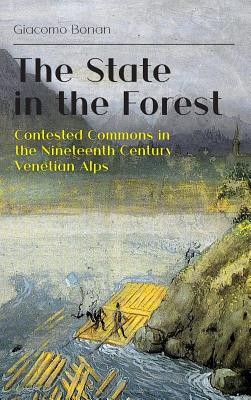
- We will send in 10–14 business days.
- Author: Giacomo Bonan
- Publisher: White Horse Press
- Year: 2019
- Pages: 240
- ISBN-10: 191218608X
- ISBN-13: 9781912186082
- Format: 15.2 x 22.9 x 1.8 cm, kieti viršeliai
- Language: English
- SAVE -10% with code: EXTRA
Reviews
Description
Environment, Economy and
the 'Great Transformation'
The State in the Forest uses a case study of conflict over use of wood - the principal source of energy and the primary raw material at the time - to offer an environmental history of the nineteenth century 'great transformation'. The focus is on Cadore, a supposedly peripheral area that was, in fact, at the core of the wood economy. The region comprises several valleys of the Eastern Italian Alps that constituted the main timber supply basin of Venice and other cities of the Veneto plain. With vivid and in-depth description of the role of forest resources for both local communities and state apparatus, the book sheds new light on key aspects of the nineteenth century agrarian world: the debate on wood shortage and the rise of scientific forestry; the social and environmental consequences of Napoleonic administrative reforms; the ambivalent relationship between privatisation of common lands and the restrictions imposed by state authorities on common and customary activities; the reorganisation of timber trade networks during the first steps of the industrial transition in continental Europe. Local socio-economic dynamics illuminate the interrelations between the macro and micro scales, showing how general transformations were perceived and experienced on the ground and how local actors were both subjects and agents of these events.
EXTRA 10 % discount with code: EXTRA
The promotion ends in 23d.00:16:57
The discount code is valid when purchasing from 10 €. Discounts do not stack.
- Author: Giacomo Bonan
- Publisher: White Horse Press
- Year: 2019
- Pages: 240
- ISBN-10: 191218608X
- ISBN-13: 9781912186082
- Format: 15.2 x 22.9 x 1.8 cm, kieti viršeliai
- Language: English English
Environment, Economy and
the 'Great Transformation'
The State in the Forest uses a case study of conflict over use of wood - the principal source of energy and the primary raw material at the time - to offer an environmental history of the nineteenth century 'great transformation'. The focus is on Cadore, a supposedly peripheral area that was, in fact, at the core of the wood economy. The region comprises several valleys of the Eastern Italian Alps that constituted the main timber supply basin of Venice and other cities of the Veneto plain. With vivid and in-depth description of the role of forest resources for both local communities and state apparatus, the book sheds new light on key aspects of the nineteenth century agrarian world: the debate on wood shortage and the rise of scientific forestry; the social and environmental consequences of Napoleonic administrative reforms; the ambivalent relationship between privatisation of common lands and the restrictions imposed by state authorities on common and customary activities; the reorganisation of timber trade networks during the first steps of the industrial transition in continental Europe. Local socio-economic dynamics illuminate the interrelations between the macro and micro scales, showing how general transformations were perceived and experienced on the ground and how local actors were both subjects and agents of these events.


Reviews